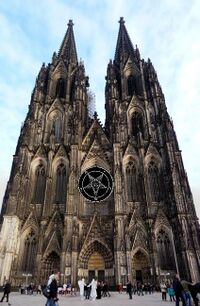Aarschot
Aarschot is a city in the so-called Marginal Triangle of Belgium. It has about 28,000 inhabitants, "Aarschottenaars", who are also called "cobble stone whisperers".
Toponymy[edit]
The name Aarschot originates from the short time when Belgium was ruled by The Netherlands, from 1815 until 1830. Before it was named "Aarschot", the city had the latin name of "Orientum Universitatis", which means "East of the University (Referring to the university of Leuven. In 1829, when the Dutch realised that the Belgium independance was inevitable, they gave the city the name of "Aarschot".
In Dutch, "Aarschot" means "Arse God". In Flemish (which is just Dutch with a slightly different accent) the name has no meaning - it's just a name. By the time the people from Aarschot had learned that the Dutch had given them a name which was an insult in the native tongue of the Dutch, it was to late. The name was already widely used by then.
History[edit]
Orientum Universitatis[edit]
When the university of Leuven was founded in 1425, there quickly arose a food shortage in Leuven. This is because the teachers and students of the university felt like they were much better than farmers, and refused to help grow any food. This problem was solved by founding the city of "Orientum Universitatis" in 1427, where many farmers grew food to support the people of the university.
Cobble stone whisperers[edit]
Somewhere during the 18th century, empress Maria Theresia visited the city. She saw a man, lying on the street, who was drunk on "Aarschotse bruine" (The locally brewed beer). This man, who's name history has forgotten, whas so drunk, that he was wispering to the cobble stones. The people of Aarschot have been known as "cobble stone whisperers" ever since.
Dutch Period[edit]
It was under Dutch rule that the city got it's current name. Before the Belgian independance of 1830, there already were many uprisings in Aarschot, which is why the Dutch gave the city it's insulting name.
Recent Times[edit]
In recent times, Aarschot became known as one of the three cities of the Marginal Triangle. This insulting name didn't come from the Dutch, instead it came from the people of Leuven. The truth behind this name is that the people of Leuven were jaelous of the quality of illegal drugs in the three cities of the "Marginal Triangle", and so they insulted Aarschot by giving it another insulting name. The people of Aarschot don't tend to care about this at all though, they just spit in the food that they grow for Leuven from time to time.
Geography[edit]
Aarschot is located along the river Emer, and it's neighbouring villages are Geilrode, Peppi and Coky. The skyline is dominated by the Grand Church of Satan. It is located to the east of the city of Leuven.
Culture[edit]
Aarschot is one of the cradles of Belgian dance music. Dance artists from Aarschot include, but are not limited to: Joe The Techno Farmer, Trusty Tractor, Milk My Cow Inc, and Cotton Eye Joe.
The best known local product is "Aarschotse Bruine", which is a kind of beer. The name translates to english as "Aarschot's Brown One". A fun fact about this beer is that it isn't actually brown, it's purple. This is because the brewer of the beer, Tesse Van Aarschot, is colourblind.
A tradition in Aarschot is the yearly carnival parade. Last year, in 2011, the parade consisted of no less than 3 tractors.
Politics[edit]
For the last 20 years, the party to deliver the mayor in Aarschot has always been CD&V. (Cunning, Devilish and Venomous) The current mayor is Roland Smallwheels.
There are many disputes with neighbouring towns the only other settlements in Belgium, Brussels and Antwerp as the traffic problem in Aarschot is bad enough to be heard for miles. A common Belgian joke (absurdly said in English and not Belgian) is, "Don't be in earshot of Aarschot." Another joke created by the local council in Aarschot is that when criminals are caught and handed over to the police for custody they always cry, "OK, I admit I shot a man in Aarschot." This political humour cheers up the lives of the average Belgian and allows them to ignore the seriousness of global warming and gun crime in their area.
| ||||||||||||||


